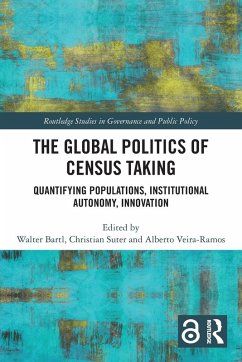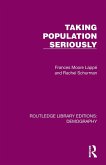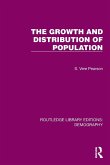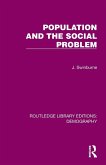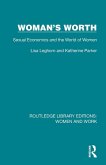The Global Politics of Census Taking
Quantifying Populations, Institutional Autonomy, Innovation
Herausgeber: Bartl, Walter; Veira-Ramos, Alberto; Suter, Christian
The Global Politics of Census Taking
Quantifying Populations, Institutional Autonomy, Innovation
Herausgeber: Bartl, Walter; Veira-Ramos, Alberto; Suter, Christian
- Broschiertes Buch
- Merkliste
- Auf die Merkliste
- Bewerten Bewerten
- Teilen
- Produkt teilen
- Produkterinnerung
- Produkterinnerung
This book examines in detail the state of the art on census taking to spark a more vivid debate on what some may see as a rather technical - and hence uncontroversial - field of inquiry.
Andere Kunden interessierten sich auch für
![Taking Population Seriously Taking Population Seriously]() Frances Moore-LappeTaking Population Seriously46,99 €
Frances Moore-LappeTaking Population Seriously46,99 €![Taking Food Public Taking Food Public]() Taking Food Public92,99 €
Taking Food Public92,99 €![Taking Sides in Social Research Taking Sides in Social Research]() Martyn HammersleyTaking Sides in Social Research61,99 €
Martyn HammersleyTaking Sides in Social Research61,99 €![Population Since the Industrial Revolution Population Since the Industrial Revolution]() Neil TranterPopulation Since the Industrial Revolution46,99 €
Neil TranterPopulation Since the Industrial Revolution46,99 €![The Growth and Distribution of Population The Growth and Distribution of Population]() S. Vere PearsonThe Growth and Distribution of Population48,99 €
S. Vere PearsonThe Growth and Distribution of Population48,99 €![Population and the Social Problem Population and the Social Problem]() J. SwinburnePopulation and the Social Problem47,99 €
J. SwinburnePopulation and the Social Problem47,99 €![Woman's Worth Woman's Worth]() Lisa LeghornWoman's Worth48,99 €
Lisa LeghornWoman's Worth48,99 €-
-
-
This book examines in detail the state of the art on census taking to spark a more vivid debate on what some may see as a rather technical - and hence uncontroversial - field of inquiry.
Produktdetails
- Produktdetails
- Verlag: Routledge
- Seitenzahl: 362
- Erscheinungstermin: 27. Juni 2025
- Englisch
- Abmessung: 234mm x 156mm x 20mm
- Gewicht: 550g
- ISBN-13: 9781032195513
- ISBN-10: 1032195517
- Artikelnr.: 74063516
- Herstellerkennzeichnung
- Libri GmbH
- Europaallee 1
- 36244 Bad Hersfeld
- gpsr@libri.de
- Verlag: Routledge
- Seitenzahl: 362
- Erscheinungstermin: 27. Juni 2025
- Englisch
- Abmessung: 234mm x 156mm x 20mm
- Gewicht: 550g
- ISBN-13: 9781032195513
- ISBN-10: 1032195517
- Artikelnr.: 74063516
- Herstellerkennzeichnung
- Libri GmbH
- Europaallee 1
- 36244 Bad Hersfeld
- gpsr@libri.de
Walter Bartl is Senior Lecturer of Sociology (Privatdozent) at Martin Luther University Halle-Wittenberg, Germany, and President of the International Sociological Association's Research Committee 41, Sociology of Population. Christian Suter is Professor Emeritus of Sociology at the University of Neuchâtel, Switzerland, and President of the International Sociological Association's Research Committee 55, Social Indicators. Alberto Veira-Ramos is Professor of Demography and Population Theory at the Carlos III University of Madrid, Spain, Treasurer of International Sociological Association's Research Committee 41, Sociology of Population, and Vice President of the Research Network on Economic Sociology of the European Sociological Association.
The Global Politics of Census Taking in the 2020 Census Round: An
introduction I. The Politics of Ethnoracial Categories 1. The Politics of a
Datascape Transformed: Ethnoracial statistics in Brazil in regional
comparative perspective 2. Census, Politics and the Construction of
Identities in India 3. Education Censuses and Recognition: The Politics of
Collecting and Using Data on Indigenous Students in Latin America II. The
Politics of Institutional Autonomy 4. Population Census - Large Scale
Project of a Public Statistics in Transition 5. Population Censuses in
Crisis: United States, Brazil, and Ecuador in comparative perspective 6.
The Latin American Observatory of Population Censuses: Increasing
statistical literacy through an academia-civil society network 7. The
Politics of Population Census, Socio-Economic Planning and Crisis of
Underdevelopment in Nigeria 8. Censuses in Ukraine: not trusted and not
needed? III. The Politics of Socio-Technical and Methodological Innovations
9. Establishing a Register-Based Census in Spain: Challenges and
implications 10. Towards a Register-based Census in Germany: Objectives,
requirements and challenges 11. Techno-political Transformation and
Adaptability in Ghanaian Census History 12. Adoption of Smartphones for
Data-Collection during the Fourth General Population and Housing Census of
Cameroon: Motivations, opportunities and challenges. Conclusions and
Desiderata for Further Research
introduction I. The Politics of Ethnoracial Categories 1. The Politics of a
Datascape Transformed: Ethnoracial statistics in Brazil in regional
comparative perspective 2. Census, Politics and the Construction of
Identities in India 3. Education Censuses and Recognition: The Politics of
Collecting and Using Data on Indigenous Students in Latin America II. The
Politics of Institutional Autonomy 4. Population Census - Large Scale
Project of a Public Statistics in Transition 5. Population Censuses in
Crisis: United States, Brazil, and Ecuador in comparative perspective 6.
The Latin American Observatory of Population Censuses: Increasing
statistical literacy through an academia-civil society network 7. The
Politics of Population Census, Socio-Economic Planning and Crisis of
Underdevelopment in Nigeria 8. Censuses in Ukraine: not trusted and not
needed? III. The Politics of Socio-Technical and Methodological Innovations
9. Establishing a Register-Based Census in Spain: Challenges and
implications 10. Towards a Register-based Census in Germany: Objectives,
requirements and challenges 11. Techno-political Transformation and
Adaptability in Ghanaian Census History 12. Adoption of Smartphones for
Data-Collection during the Fourth General Population and Housing Census of
Cameroon: Motivations, opportunities and challenges. Conclusions and
Desiderata for Further Research
The Global Politics of Census Taking in the 2020 Census Round: An
introduction I. The Politics of Ethnoracial Categories 1. The Politics of a
Datascape Transformed: Ethnoracial statistics in Brazil in regional
comparative perspective 2. Census, Politics and the Construction of
Identities in India 3. Education Censuses and Recognition: The Politics of
Collecting and Using Data on Indigenous Students in Latin America II. The
Politics of Institutional Autonomy 4. Population Census - Large Scale
Project of a Public Statistics in Transition 5. Population Censuses in
Crisis: United States, Brazil, and Ecuador in comparative perspective 6.
The Latin American Observatory of Population Censuses: Increasing
statistical literacy through an academia-civil society network 7. The
Politics of Population Census, Socio-Economic Planning and Crisis of
Underdevelopment in Nigeria 8. Censuses in Ukraine: not trusted and not
needed? III. The Politics of Socio-Technical and Methodological Innovations
9. Establishing a Register-Based Census in Spain: Challenges and
implications 10. Towards a Register-based Census in Germany: Objectives,
requirements and challenges 11. Techno-political Transformation and
Adaptability in Ghanaian Census History 12. Adoption of Smartphones for
Data-Collection during the Fourth General Population and Housing Census of
Cameroon: Motivations, opportunities and challenges. Conclusions and
Desiderata for Further Research
introduction I. The Politics of Ethnoracial Categories 1. The Politics of a
Datascape Transformed: Ethnoracial statistics in Brazil in regional
comparative perspective 2. Census, Politics and the Construction of
Identities in India 3. Education Censuses and Recognition: The Politics of
Collecting and Using Data on Indigenous Students in Latin America II. The
Politics of Institutional Autonomy 4. Population Census - Large Scale
Project of a Public Statistics in Transition 5. Population Censuses in
Crisis: United States, Brazil, and Ecuador in comparative perspective 6.
The Latin American Observatory of Population Censuses: Increasing
statistical literacy through an academia-civil society network 7. The
Politics of Population Census, Socio-Economic Planning and Crisis of
Underdevelopment in Nigeria 8. Censuses in Ukraine: not trusted and not
needed? III. The Politics of Socio-Technical and Methodological Innovations
9. Establishing a Register-Based Census in Spain: Challenges and
implications 10. Towards a Register-based Census in Germany: Objectives,
requirements and challenges 11. Techno-political Transformation and
Adaptability in Ghanaian Census History 12. Adoption of Smartphones for
Data-Collection during the Fourth General Population and Housing Census of
Cameroon: Motivations, opportunities and challenges. Conclusions and
Desiderata for Further Research

